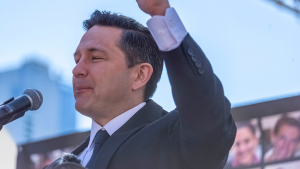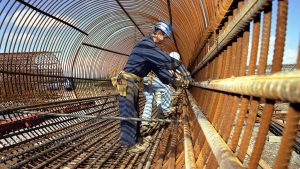Vancouver construction leaders assembled at the Independent Contractors and Businesses Association’s (ICBA) 2024 Construction Innovation Summit for a session on talent and culture.
ICBA Benefits vice-president Leah Rennie moderated the panel made up of Ventana Construction president Dan Marsolais, Novacom Building Partners principal Sharelle Dayco and Metro-Can Construction president Kris Barnard.
The panellists agreed in a post-COVID-19 work environment flexibility and a willingness to adapt to different approaches to work has increased in importance.
“As an industry, if we want people attracted to (working in) it, why not present different options?” Dayco said.
“We have people at work throughout British Columbia both in the field but also as project managers and co-ordinators. If the trust is already built, why not have a little innovation.”
“People, process and innovation drive us and COVID really opened our eyes because we were forced to create different solutions for individuals,” Marsolais said.
He added some of Ventana’s projects were in remote areas and are managed remotely, so it is possible to adapt that approach to local operations.
Barnard said it’s been difficult for his firm to reconcile the differences between site and office work.
“We’ve always been flexible, but I think construction is unique. All our site workers don’t have the option of remote work. There’s always been a divide between the site and the office and going full remote for office will increase that divide,” he said.
Rennie asked the panel how they build culture once they’ve recruited new workers into their companies and Dayco said it boils down to people over projects.
“We want more interesting, challenging projects for the team as it is about the pipeline but also, what are you giving your people?” she said.
“You can build all the things but ultimately, people have to participate. It has to be compelling.”
“We try to build a community where people don’t want to leave,” Barnard said. “That’s not easy and starts with leadership and sprinkling in activities to connect people. Leaders have to have a passion for it. People have a good BS meter and if they don’t believe it, they’ll sniff it out.”
“If you have to talk about how good your culture is, you’re probably doing it wrong,” Marsolais said. “People need to feel like they have a sense of purpose, are valued and fit in and that comes down to the culture.
“You should challenge each other’s ideas in a respectful way but it’s really challenging each other to find the right idea,” he said.
Barnard pointed out while finance can often be a company’s dominant focus, the relationship side of the business can suffer as a result.
“When you hire people who are good at the relationship side, you end up with a pretty good group to hang out with. (But) it’s a fragile thing and you can do something and wreck it pretty easily. As a leader, you can make a glib comment that’s taken the wrong way.”
“We all have different business objectives, but they have to be clear and common across your team. It’s not easy but fundamentally necessary,” Marsolais said. “Identity creates purpose and lack of identity creates disfunction.”
“If you’re new or trying to climb the ladder you can never stop learning, but the relationship part can’t be forgotten. And as you climb the ladder you’ll do less construction things and more people things, and sometimes no construction things,” Barnard added.






Recent Comments
comments for this post are closed